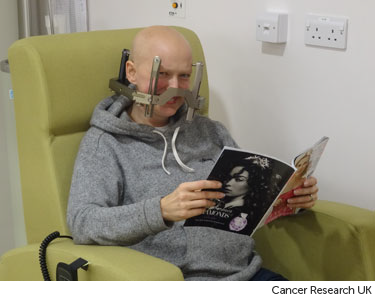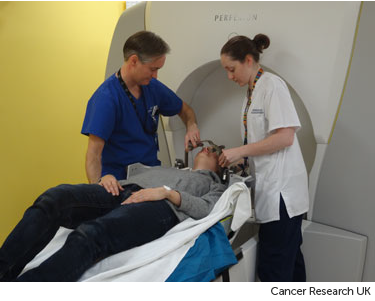Stereotactic radiotherapy for brain tumours
Stereotactic radiotherapy is a way of targeting radiotherapy very precisely at a tumour. This type of treatment is not available at all hospitals because it needs specialist equipment and skills.
Stereotactic radiosurgery
You might hear the term stereotactic radiosurgery. This isn’t a type of brain surgery. It means having a very high dose of stereotactic radiotherapy to a small area. You usually have a single treatment.
What is stereotactic radiotherapy?
Stereotactic radiotherapy gives radiotherapy from many different angles around the body. The beams meet at the tumour. This means that the tumour receives a high dose of radiation and the tissues around it receive a much lower dose. This lowers the risk of side effects.
You usually have treatment through a machine called a linear accelerator (LINAC). But you may also have it on a CyberKnife or GammaKnife machine.

When you might have stereotactic radiotherapy and radiosurgery
Stereotactic radiotherapy and radiosurgery isn’t suitable for everyone. You might have this type of treatment if you have a:
- vestibular schwannoma
- meningioma
- pituitary gland tumour
- cancer that has spread to the brain from somewhere else in the body (secondary brain tumour)
You are most likely to have it for small tumours that measure less than 3 cm across.
Secondary brain tumours are different from primary brain tumours. We have separate information about secondary brain tumours.
How often do you have stereotactic radiotherapy and radiosurgery?
The full dose of stereotactic radiotherapy treatment is usually divided into smaller doses called fractions. The number of fractions you have can vary from between 2 and 5. You have one treatment (fraction) a day.
For radiosurgery, you usually have a single treatment (fraction).
Before radiotherapy starts
Your head needs to be kept as still as possible during radiotherapy. This is so the treatment is as accurate as possible. Keeping the head still is called immobilisation. So, before you start radiotherapy you have a radiotherapy mask made or a head frame fitted.
Radiotherapy mask
Most people have a radiotherapy mask made from plastic. It is called a thermoplastic mask. The mask attaches to the scanner or radiotherapy machine while you are wearing it. This means that you can't move your head.
Voiceover: Making a mesh mask for radiotherapy takes a few minutes.
Radiographer: I am just going to heat this up now if you just keep nice and still there and just want to close your eyes for us.
Voiceover: The radiographer softens the mask by putting it in warm water for a minute or two. When the radiographer puts the mask on to your face it will feel warm and damp. They then clip it to the bed that you are lying on. It takes a minute or two to dry into the shape of your face. The radiographers will mark the mask where the light lines are.
Radiographer: Okay, you are just going to feel us pressing down on the mask there; you are doing really well are you still okay?
Patient: Mmm...
Voiceover: They use the marks on the mask to line up the machine each time you have treatment. The mask keeps your head still and makes sure that your treatment is directed at the cancer. They put your name on the mask and keep it in the radiotherapy department ready for your treatment.
Patient: They um told me about the procedure, a mask being fitted, uumm that it would be moulded to the shape of my face. Umm which they did, three lovely girls umm put my mind at ease, sat me down, heated the mask, moulded it around my face, um not an uncomfortable thing at all to go through.
Head frame
You have a head frame fitted if you are going to have treatment from a GammaKnife machine.
Your treatment team attaches a frame to your skull using 4 pins. Before they attach the frame, you have injections of local anaesthetic so that you don’t feel any pain. As the frame is fitted, you might feel some pressure and tightness, but it usually feels better within a few minutes.
The treatment team removes the frame when your treatment finishes.


Planning CT scan
Before treatment, you also have a planning CT scan. This helps your doctors map where the radiation needs to go.
The radiotherapy room
Radiotherapy machines are very big and could make you feel nervous when you see them for the first time. The machine rotates around you to give the treatment. But it doesn't touch you at any point.
Before your first treatment, your radiographers will explain what you will see and hear. In some departments, the treatment rooms have docks for you to plug in your music player. So you can listen to your own music.
Having stereotactic radiotherapy
To have treatment you lie on the treatment table. Because your position is so important, the radiographers may take a little while to get you ready. The radiographers attach your mask or head frame into the treatment table. They then leave the room before your treatment starts. This is so they are not exposed to the radiation.
Your radiographers watch and listen to you on a CCTV screen in the next room. Tell them if you need to move or want the machine to stop.
You need to lie very still. The machine makes whirring and beeping sounds. You can't feel the radiotherapy when you have the treatment.
When the treatment is over, the radiographers help you out of the machine. They remove the mask or the frame and you can go back home or to the ward.
Daniel (radiographer): Before your treatment starts your doctor will need to work out exactly where the treatment needs to go and also which parts need to be avoided by the treatment.
To have radiotherapy you lie in the same position as you did for your planning scans.
To stop you moving and to make sure your treatment is directed at the cancer you wear a custom mask over your face which is attached to the couch.
We line up the machine using marks on your mask and then leave the room. We control the machine form a separate room this is so we aren’t exposed to radiation.
Treatment takes a few minutes and you’ll be able to talk to us using an intercom. We can see you and hear you while you’re having treatment and we will check that you’re OK.
When your treatment starts you won’t feel anything. You may hear the machine as it moves around you giving the treatment from different angles.
Because we’re aiming to give the same treatment to the same part of the body every day the treatment process is exactly the same everyday so you shouldn’t really notice any difference.
You’ll see someone from the team caring for you once a week while you’re having treatment. They’ll ask how you are and ask about any side effects.
You won't be radioactive
This type of radiotherapy won't make you radioactive. It's safe to be around other people, including pregnant women and children.
Travelling to radiotherapy appointments
You might have to travel a long way each day for your radiotherapy. This depends on where your nearest cancer centre is. This can make you very tired, especially if you have side effects from the treatment.
You can ask your radiographers for an appointment time to suit you. They will do their best, but some departments might be very busy. Some radiotherapy departments are open from 7 am till 9 pm.
Car parking can be difficult at hospitals. Ask the radiotherapy staff if you are able to get free parking or discounted parking. They may be able to give you tips on free places to park nearby.
Hospital transport may be available if you have no other way to get to the hospital. But it might not always be at convenient times. It is usually for people who struggle to use public transport. Or who have any other illnesses or disabilities. You might need to arrange hospital transport yourself.
Some people are able to claim back a refund for healthcare travel costs. This is based on the type of appointment and whether you claim certain benefits. Ask the radiotherapy staff for more information about this and hospital transport.
Some hospitals have their own drivers and local charities might offer hospital transport. So do ask if any help is available in your area.
Side effects
Stereotactic radiotherapy and radiosurgery have fewer side effects than the standard type of external radiotherapy. This is because the area treated is smaller and so less healthy brain tissue is exposed to radiation.
You might feel tired for some time after treatment. But there are other possible side effects.



